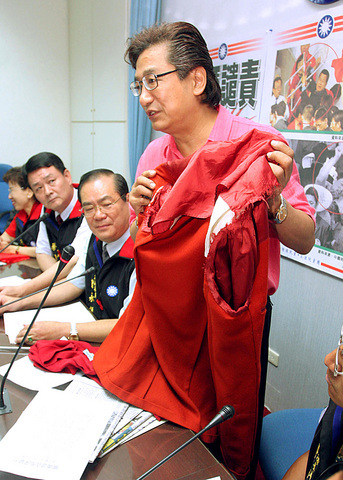A day after instability marked Tuesday's national day celebrations, lawmakers yesterday engaged in finger-pointing over who should take the blame.
Scuffles between Democratic Progressive Party (DPP) lawmakers and pan-blue camp lawmakers with the Chinese Nationalist Party (KMT) and People First Party (PFP) broke out as President Chen Shui-bian (陳水扁) delivered his Double Ten National Day speech.
KMT Legislator Lee Ching-hua (李慶華) told a press conference that he suffered from minor cerebral concussion after being beaten up by a group of DPP lawmakers.

PHOTO: CNA
"That was a planned attack by the DPP on me," Lee said.
He then went to the Taipei District Prosecutors' Office and filed suit against eight DPP lawmakers.
Lin Kuo-ching (林國慶), one of the eight lawmakers, told a separate press conference that he beat Lee.
"I beat Lee Ching-hua to defend Taiwan's dignity," Lin said. "It is wrong to hit a person. It is also wrong to hit an animal. But if a person is inferior to an animal, then he deserves to be beaten."
KMT Legislator Chu Fong-chi (朱鳳芝) said blue-camp legislators had chanted slogans during Chen's speech because a white cloth barrier erected to separate their seats from the president's grandstand had blocked Chen's view of the lawmakers.
"We had no choice but to chant. Otherwise, Chen couldn't see our banners," Chu said.
Two red-clad protesters were the first to disrupt the speech. They were seated about 50m to the right and rear of Chen.
DPP Legislator Kao Chien-chih (高建智) said the two were staffers at PFP headquarters and that one of the two seats had been given to PFP Chairman James Soong (宋楚瑜).
Kao said the PFP had arranged for the pair to sit in that location so that TV cameras could capture the disturbance.
In response to Presidential Office Secretary-General Mark Chen's (陳唐山) complaint that Legislative Speaker Wang Jin-pyng (王金平) had not kept his promise that the celebrations would proceed smoothly, Wang said he had not said anything of the sort.
Wang said that on the eve of the celebrations, he met KMT Legislator Hung Hsiu-chu (洪秀柱), and that it was Hung who had promised not to disrupt the president's speech.
"The lawmakers' seats were changed and the white cloth barrier was erected -- both at the last minute -- which was why pan-blue lawmakers were not happy," Wang said, without saying who was responsible for the change.

An essay competition jointly organized by a local writing society and a publisher affiliated with the Chinese Communist Party (CCP) might have contravened the Act Governing Relations Between the People of the Taiwan Area and the Mainland Area (臺灣地區與大陸地區人民關係條例), the Mainland Affairs Council (MAC) said on Thursday. “In this case, the partner organization is clearly an agency under the CCP’s Fujian Provincial Committee,” MAC Deputy Minister and spokesperson Liang Wen-chieh (梁文傑) said at a news briefing in Taipei. “It also involves bringing Taiwanese students to China with all-expenses-paid arrangements to attend award ceremonies and camps,” Liang said. Those two “characteristics” are typically sufficient

A magnitude 5.9 earthquake that struck about 33km off the coast of Hualien City was the "main shock" in a series of quakes in the area, with aftershocks expected over the next three days, the Central Weather Administration (CWA) said yesterday. Prior to the magnitude 5.9 quake shaking most of Taiwan at 6:53pm yesterday, six other earthquakes stronger than a magnitude of 4, starting with a magnitude 5.5 quake at 6:09pm, occurred in the area. CWA Seismological Center Director Wu Chien-fu (吳健富) confirmed that the quakes were all part of the same series and that the magnitude 5.5 temblor was

The brilliant blue waters, thick foliage and bucolic atmosphere on this seemingly idyllic archipelago deep in the Pacific Ocean belie the key role it now plays in a titanic geopolitical struggle. Palau is again on the front line as China, and the US and its allies prepare their forces in an intensifying contest for control over the Asia-Pacific region. The democratic nation of just 17,000 people hosts US-controlled airstrips and soon-to-be-completed radar installations that the US military describes as “critical” to monitoring vast swathes of water and airspace. It is also a key piece of the second island chain, a string of

The Central Weather Administration has issued a heat alert for southeastern Taiwan, warning of temperatures as high as 36°C today, while alerting some coastal areas of strong winds later in the day. Kaohsiung’s Neimen District (內門) and Pingtung County’s Neipu Township (內埔) are under an orange heat alert, which warns of temperatures as high as 36°C for three consecutive days, the CWA said, citing southwest winds. The heat would also extend to Tainan’s Nansi (楠西) and Yujing (玉井) districts, as well as Pingtung’s Gaoshu (高樹), Yanpu (鹽埔) and Majia (瑪家) townships, it said, forecasting highs of up to 36°C in those areas